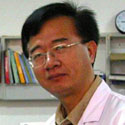Advisory Board and Editors Immunology

Carlo Ennio Pucillo
Carlo Pucillo is a Full Professor in Immunology at the School of Medicine of the University of Udine.
In his scientific career Prof. Carlo Pucillo has studied the "non canonical function" of MHC class II and the molecular mechanism that regulate the B cell activation and differentiation. From 2-1991 to 6-1994 Dr Pucillo has been Visiting Scientist at NCI in Bethesda, MD-USA.
He has acquired a considerable expertise in advanced molecular biology analysis as well as a good understanding of the immunobiology of the immune response, of the non canonical function of MHC class II molecules, in particular, as documented by his publications on this subjects.
He has also investigated the signal transduction pathways elicited by T-B cell interaction via CD40-CD154. CD40 is a B cell surface receptor that belongs to the pleiotropic tumor necrosis factor receptor (TNFR) superfamily. The interaction between CD40 and its ligand promotes proliferation, cytokine production, upregulation of various surface molecules involved in antigen presentation, germinal center and memory B cell formation antibody isotype switching and affinity maturation and the B cell life span.
Most recently, his interest is in the study of regulatory role of Mast Cells in the microenvironment and subsequently in the tissutal tolerance and adaptive immune response. This body of work may provide a conceptual framework to therapeutically manipulate these responses in the settings of autoimmune disease and cancer.

Jiangjiang Qin
Dr. Jiangjiang Qin is currently a Professor of Cancer Pharmacology and Drug Discovery at the Institute of Basic Medicine and Cancer (IBMC), Chinese Academy of Sciences and the Cancer Hospital of the University of Chinese Academy of Sciences (Zhejiang Cancer Hospital).
Dr. Qin received his B.S. degree in Pharmacy (2006) and Ph.D. in Biomedical Engineering with the highest honor (2011) from Shanghai Jiao Tong University, China, under the supervision of Professor Wei-Dong Zhang. After completion of Post-Doctoral training in cancer biology, pharmacology, and molecular therapeutics at Texas Tech University Health Sciences Center (TTUHSC) in 2014, Dr. Qin continued his research work at TTUHSC as a Research Associate and a Senior Research Associate and at the University of Houston as a Senior Research Scientist. Dr. Qin joined Zhejiang Chinese Medicinal University as a Full Professor in 2018 and then moved to IBMC in 2020.
Dr. Qin’s research mainly focuses on the discovery and development of novel, effective, and safe anticancer agents as well as demonstrating the molecular targets and mechanisms of action. He has published more than 150 research papers and reviews. He is also an Associate Editor of Frontiers in Pharmacology and Frontiers in Oncology and an Editorial Board Member of more than 10 scientific journals such as Recent Patents on Anti-Cancer Drug Discovery, Journal of Cancer Research Updates, World Journal of Traditional Chinese Medicine.

Priya Ramesh Prabhu
Priya Ramesh Prabhu is a Postdoctoral research fellow in the Human Biology Division at Fred Hutchinson Cancer Center, Seattle, WA. She is an immunologist with focus on Human papillomavirus (HPV) vaccination. Her expertise is in evaluation of vaccine-induced immune responses. She completed her PhD from Rajiv Gandhi Center for Biotechnology, Kerala, India, working in a Phase IV clinical trial comparing the efficacy of 2 vs 3 doses of quadrivalent HPV vaccine among Indian girls.

Tanu Rana
Dr. Tanu Rana has a Ph.D. in Microbiology from AIIMS, New Delhi and a Master’s degree in biotechnology. Her research pursuits have spanned multiple facets of life sciences, from research on host-pathogen interaction to directing and collaborative research through a microscopy core facility.
Over the course of her career, Dr. Rana has published widely in peer-reviewed journals and presented her findings at national and international conferences, contributing meaningful insights to the fields of infectious diseases, and novel diagnostic approaches.
Beyond lab research, Dr. Rana is committed to the development of the next generation of healthcare professionals and scientists. She has taught and continues to teach medical, dental, master’s and graduate students, offering lectures, active learning opportunities, hands-on laboratory instruction, and mentorship that bridges theoretical knowledge and practical skills.


Pamela C Ronald
Professor, Dept Plant Pathology and the Genome Center, UC Davis. Director, Grass Genetics, JBEI. Fellow of the American Association for the Advancement of Science. Recipient of the USDA 2008 National Research Initiative Discovery Award. 2009 recipient of the National Association of Science Writers Science in Society Journalism Award. Selected as one of the 100 most creative people in business by Fast Company Magazine. Co-author of Tomorrow's Table: Organic Farming, Genetics, & the Future of Food

Camillo Rosano
A physicist; in 1996 Camillo Rosano started his studies in Macromolecular Crystallography at the Advanced Biotechnology Center, Genova (I). In 1997 he achieved the Advanced Certificate in Principles of Protein Structures (PPS), Birkbeck College, University of London, UK, and in 1998 he spent a period at the “York Structural Biology Laboratory” York University, York, UK for a Macromolecular crystallography traineeship. He participated to the NASA expeditions STS100/ISS6A and STS110/ISS7A by designing experiment of protein crystallization on-board the International Space Station (ISS). Director of different Courses and Workshops, he is the author/coauthor of more than 100 peer-reviewed scientific publications.
Dr. Rosano is a Full Professor in Biochemistry and Full Professor in Applied Biology. Italian Ministry for University, Education and Research (MIUR), 2012.

Angela Rösen-Wolff
Study of Medicine at the Ruprecht-Karls-Universiy in Heidelberg, Germany; Habilitation in Experimental Virology. Head of Clinical Research at the Department of Pediatrics, University Hospital Carl Gustav Carus at TU Dresden, Germany, since 1995. Speaker of Clinical Research Unit 249 "Defects of the Innate Immune System in Autoinflammation and Autoimmunity" since 2010

Martina Schroeder
Dr Martina Schroeder is a Lecturer and Head of the Host-Pathogen Interaction Lab at Maynooth University. Her research addresses viral recognition, innate immune signaling pathways, and the roles of DEAD-box proteins in immunity. Previously Dr Schroeder conducted postdoctoral research with Prof. Andrew Bowie at Trinity College Dublin. In 2007, she was awarded a postdoctoral career development fellowship by the Irish HRB. She completed her PhD at the Charité University Hospital in Berlin in 2003.

Huashan Shi
Professor Shi Huashan is an Associate Professor at Sichuan University. His expertise is in the molecular biology of tumours and tumour transcriptomics. He is currently engaged in clinical and basic translational research, including tumour microenvironment and novel immunotherapeutic modalities, and research on the mechanisms and medical applications related to tumour cell vaccines.

Arif J Siddiqui
Dr. Arif Jamal Siddiqui is an Associate Professor and Principal Investigator at the Department of Biology, College of Science, University of Hail, Saudi Arabia. He received his PhD from CSIR-Central Drug Research Institute, Lucknow, India in 2015. From 2015 to 2018, he worked as a Post-Doctoral Fellow at Texas Tech University Health Sciences Center, Lubbock, Texas, United States of America.
He has more than 8 years of experience in research, teaching and administration. In his professional work, he has received research grants as a Principal Investigator from various renowned organizations. He has successfully published more than 100 publications in internationally recognized peer-reviewed prestigious journals, published several book chapters for internationally renowned publishers and presented many articles and posters in various conferences/workshops worldwide. He has published numerous papers in the fields of parasitology, immunology, herbal medicine, vaccine development, drug discovery and natural products with a specialization in anti-parasitic, antiviral, anticancer and antibacterial agents. Furthermore, he is a member of The Indian Science Congress Association, India and the Annals of Parasitology, Poland. He has reviewed more than 250 manuscripts and he also currently holds various editorial positions (Academic, Associate, Guest and Review Editor) in various reputable journals and has edited more than 150 manuscripts.

Linsheng Song
Professor of Marine Biology and Vice President of Dalian Ocean University. Member of council of the Chinese Society of Malacology, fellow of the Chinese Society for Oceanology and Limnology. Editorial Board Member of Fish & Shellfish Immnology, Developmental and Comparative Immunology, Scientific Report.

